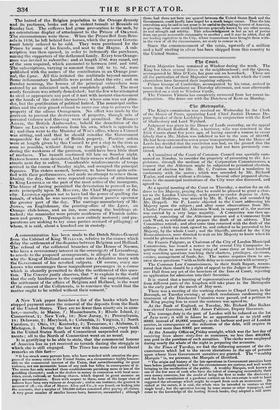The hatred of the Belgian population to the Orange dynasty
and its partisans, broke out in a violent tumult at Brussels on Sunday last. The sufferers had given provocation to the mob, by an ostentatious display of attachment to the Prince of ORANGE. The circumstances were these. When the Prince tied from Brus- sels in 1830, he left behind four horses, which the present Govern- ment lately ordered to be sold. They were purchased for the Prince by some of his friends, and sent to the Hague. A sub- scription was then opened, in order to indemnify the purchaser, among the supporters of the dethroned family. Every true Orange- Man was invited to subscribe; and at length 370/. was raised, out of the sum required, which amounted to between 500/. and 600/. The subscriptions, varying in amount from 20/. to Is. 8d., were published with the names of the contributors in an Orange jour- nal, the Lynx. All this irritated the multitude beyond measure. Some inflammatory handbills were posted about the city ; and on Sunday morning, the houses of the principal subscribers were entered by an infuriated mob, and completely gutted. The most costly furniture was utterly demolished; but the few who attempted to steal or appropriate any part of it met with instant chastisement at the hands of the rioters themselves ; whose aim was not plun- der, but the gratification of political hatred. The municipal autho- rities and the civic guard refused to move one step to preserve the property of the odious Orangemen. No effort was made by the garrison to prevent the destruction of property, though acts of personal violence and thieving were not permitted. Sir ROBERT ADAIR, the British Ambassador, beheld the demolition of the Prince DE LIGNE'S residence from his OWD, which is opposite to it; and then went to the Minister of War's office, where a Council was sitting, and said that he should consider the Government responsible for the safety of British property. Positive orders were at length given by this Council to put a stop to the riots as soon as possible, without firing on the people ; which, consi- dering the weakness of the garrison, would have been little short of madness. The tumult continued till late on Sunday night. Sixteen houses were devastated, but their owners walked about the streets next day in safety. Considerable reinforcements of troops arrived in the course of Sunday night, and occupied the principal Squares. The rioters seemed, however, to have been quite sans- Med with their performances, and made no attempt to renew them. During the day, there were repeated expressions of attachment to King LEOPOLD on the part of the most active of the insurgents. The blame of having permitted the devastation to proceed so far, rests principally upon M. ROUPPE, the Chief Magistrate of the city. LEOPOLD appears not to have had the power of quelling the tumult, of which he was necessarily an almost passive spectator the greater part of the day. The carriage-manufactory of Mr. JONES, an Englishman, the printing-office of the Lynx, an Orange club-house, and an inn, were among the buildings at- tacked ; the remainder were private residences of Flemish noble- men and gentry. Tranquillity is now entirely restored ; and pre- parations are making to try some parties accused of pillaging; of whom, it is said, about a hundred are in custody.




















 Previous page
Previous page